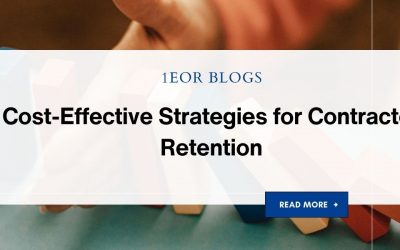In today’s digital age, businesses no longer need to be confined by borders. Companies are hiring talent from across the globe to tap into new skills, expand markets, and operate round the clock. But with global hiring comes a new complexity—managing a culturally diverse workforce. This is where Employer of Record (EOR) services step into the spotlight.
The Role of EORs in Cross-Cultural Workforce Management goes far beyond simple payroll and compliance. EORs are now strategic partners, ensuring seamless integration of diverse teams while respecting local customs, laws, and work ethics. They help businesses hire globally without setting up legal entities and ensure that employees from different countries feel included, respected, and supported.
As remote and hybrid models become the new norm, understanding how EORs can optimize cross-cultural employee experiences is essential for business success. Let’s explore how these global HR enablers are redefining the rules of workforce management.
Why Cross-Cultural Workforce Management Matters More Than Ever
Workforce globalization is booming. Companies across sectors—tech, e-commerce, consulting, and finance—are tapping into global talent pools. But managing teams from different cultural, linguistic, and legal backgrounds is a challenge that requires a nuanced approach.
Here’s why cross-cultural workforce management is crucial:
- It ensures team harmony across borders.
- It reduces communication breakdowns caused by cultural misunderstandings.
- It boosts employee retention in diverse teams.
- It enhances organizational adaptability in foreign markets.
- It ensures legal compliance with labor laws in every region.
An effective cross-cultural strategy goes beyond hiring. It includes onboarding, communication, benefits alignment, legal compliance, and managing local nuances of work-life balance. But here’s the challenge: very few companies have the expertise or infrastructure to handle these complexities in-house. That’s where EORs (Employer of Record) become indispensable.
How EORs Simplify Global Hiring Across Cultures
To fully grasp The Role of EORs in Cross-Cultural Workforce Management, it’s essential to understand what an EOR does. At its core, an EOR is a third-party organization that hires and pays an employee on behalf of another company. But their function today has evolved far beyond this basic definition.
Let’s take a look at how EORs simplify global workforce operations:
| Function | EOR’s Contribution |
| Legal Compliance | Manages contracts, work permits, and tax requirements in each country |
| Payroll & Benefits | Ensures timely payments, manages local benefits, healthcare, and retirement plans |
| Onboarding & Training | Delivers culturally sensitive onboarding experiences |
| Conflict Resolution | Acts as a cultural mediator and ensures alignment of expectations |
| Employee Experience | Supports mental well-being, communication, and remote engagement |
An EOR works as your global HR arm—but with deep local knowledge. This combination is key when managing cross-border teams where cultural intelligence is just as important as operational efficiency. Whether it’s understanding workplace hierarchies in Asia, siesta culture in Latin America, or holiday norms in Europe, EORs tailor the approach to make employees feel valued and understood.
Building Cultural Intelligence Through EOR Support
Managing a multicultural workforce isn’t just about checking boxes on compliance. It’s about building cultural intelligence—the ability to understand, respect, and adapt to different cultural practices in a work setting. The Role of EORs in Cross-Cultural Workforce Management lies in enabling this intelligence at scale.
Here’s how EORs foster cultural intelligence:
- Custom Onboarding: Every new hire is onboarded with consideration of their cultural norms, communication style, and regional expectations.
- Localized Work Policies: From national holidays to dress codes, EORs design policies that are inclusive and appropriate for each region.
- Conflict Management: Cultural misunderstandings can spark friction. EORs mediate effectively with cultural sensitivity.
- Training Initiatives: They support cultural training for global teams, helping them collaborate better across borders.
These practices prevent unconscious biases, miscommunication, and even legal liabilities. Employees who feel seen and respected are more likely to perform, stay loyal, and contribute positively to your global vision.
Enabling Global Mobility Without Legal Complexity
One of the biggest obstacles in international hiring is compliance with local labor laws. Different countries have unique laws for probation periods, severance packages, taxation, employee protections, and more. For companies trying to expand internationally, navigating these laws can be overwhelming and risky.
This is where EORs become mission-critical. They allow companies to:
- Hire employees in countries without setting up a legal entity
- Avoid legal penalties by staying compliant with labor laws
- Stay updated on changing local regulations
- Manage taxation and social security contributions smoothly
- Handle work visa sponsorships and documentation
EORs act as the legal employer on paper, taking on the full responsibility for contracts, taxes, and filings. The company retains full control over the employee’s day-to-day activities, while the EOR ensures everything behind the scenes is legally sound and culturally appropriate.
Imagine you’re a U.S.-based SaaS startup hiring a remote developer in Germany. Do you understand German labor laws? Or what qualifies as unfair dismissal there? Probably not. But an EOR does—and ensures you stay protected while building global teams.
Driving Inclusion and Diversity at a Global Scale
A multicultural workforce is a strength—when managed right. Employees from different cultures bring fresh perspectives, innovative thinking, and broader market insight. But true inclusion doesn’t happen automatically. It needs to be designed, supported, and cultivated. That’s where EORs play a unique role.
The Role of EORs in Cross-Cultural Workforce Management extends into building inclusive work cultures. They provide tools and frameworks that help organizations:
- Avoid cultural favoritism or exclusionary practices
- Develop diversity-first hiring practices
- Respect local religious or cultural observances
- Foster safe reporting environments for grievances
- Encourage equal growth opportunities across regions
These elements are often overlooked in internal HR teams that lack global exposure. By partnering with an EOR, companies gain access to experts who understand local sensitivities and align those with your global mission.
Let’s not forget, inclusion isn’t just a “nice-to-have” — it’s a business driver. Diverse companies perform better, innovate faster, and attract top global talent. And EORs are the bridge that makes it possible.
Streamlining Communication Across Borders
Cross-cultural communication challenges can erode even the best teams. From time zone misalignments to language barriers, managing communication in a global workforce requires careful planning. Poor communication leads to missed deadlines, confusion, and frustration.
Here’s how EORs add value:
- Time Zone Alignment: Helps coordinate workflows across global time zones.
- Language Sensitivity: Provides translation or local language support during onboarding and HR communication.
- Meeting Etiquette Training: Educates teams on international business etiquette—what’s respectful in Japan might be seen as aloof in Brazil.
- Feedback Culture: Promotes healthy, culturally aware feedback systems.
All these practices contribute to a smoother employee experience and better project outcomes. A talented employee may not stay long if they constantly feel misunderstood or out of sync. EORs help avoid this attrition by ensuring employees feel connected, heard, and aligned with team values.
Case in Point: How 1eor Stands Out in Cultural Workforce Management
When it comes to delivering exceptional EOR solutions tailored for multicultural teams, 1eor stands out as a top choice. Their approach to “The Role of EORs in Cross-Cultural Workforce Management” is proactive, not reactive.
What makes them unique?
- Localized HR specialists in 100+ countries who understand cultural nuances
- A platform that simplifies onboarding and payroll in multiple languages
- Real-time support for both employers and employees in their native language
- Custom policies that integrate local culture with global company goals
- Commitment to diversity, equity, and inclusion (DEI) in all hiring practices
Companies that partner with 1eor often report faster onboarding, lower attrition rates, and higher employee engagement across geographies. They don’t just manage people—they empower teams across cultures to succeed.
The Cost of Ignoring Cross-Cultural Management
Let’s not sugarcoat it. Ignoring cross-cultural workforce management isn’t just inefficient—it’s dangerous. The fallout includes:
- High employee churn due to lack of inclusion
- Compliance violations leading to fines or lawsuits
- Miscommunication that derails projects
- Damaged employer reputation in global markets
- Missed opportunities for innovation and growth
In contrast, companies that invest in strong EOR partnerships benefit from:
- Stronger global team cohesion
- Lower HR overhead and legal risk
- Faster market entry and exit strategies
- Increased brand trust from international candidates
The ROI of a strategic EOR solution is undeniable—especially when that solution goes beyond logistics and actively supports multicultural integration.
Conclusion: The EOR Advantage in a Multicultural World
In a world that’s more connected—and more competitive—than ever before, managing global teams with cultural intelligence is no longer optional. It’s mission-critical.
The Role of EORs in Cross-Cultural Workforce Management is to ensure that every employee, regardless of geography, feels valued, compliant, and connected. From handling complex legal frameworks to fostering inclusive workplace cultures, EORs unlock the power of a truly global workforce.
Whether you’re a startup scaling rapidly or a large enterprise expanding into new markets, an EOR offers the agility, expertise, and cultural insight needed to grow without borders—and without mistakes.
If you want to unlock global growth without cultural breakdowns, it’s time to rethink your strategy—and let EORs lead the way.


